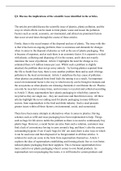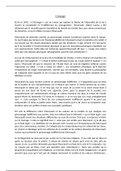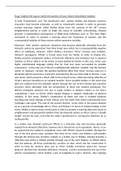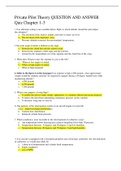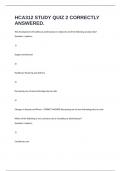How guilt is presented in Macbeth?
In Macbeth, Shakespeare presents guilt as causing extreme mental and physical
degradation and consequently leading to Lady Macbeth and Macbeth’s demise.
Though initially attempting to either dismiss or manage their expansive guilt, by the
end of the play both are so consumed with the unescapable nature of guilt that they
break down and their natural withheld regime collapses, along with their sanity.
Shakespeare also presents Macduff’s, more socially accepted and appropriate, guilt
at not being able to protect his family from the uproar and violence within Scotland,
but on the contrast, he utilises this guilt to propel him to take revenge against
Macbeth. Through this juxtaposition of origins of guilt, Shakespeare shines a light on
the more loyal and affectionate mannerisms of Macduff and the ‘bloody’ and
‘sacrilegious’ actions of Macbeth, thus pleasing King James, who shared a familial
connection to King Duncan and Macduff.
In the extract, Shakespeare presents guilt as a prime factor influencing Macbeth to
mentally degrade. Lady Macbeth sustains stability and sense throughout the play,
commanding her husband ‘give me the daggers’ and ‘be not lost so poorly in your
thoughts’ and methodically ensures that evidence is planted on the grooms so that ‘it
must seem their guilt’. At this point, for Lady Macbeth, guilt is merely an additional
aspect of her plan that she must consider, unlike Macbeth, whose sole mentality is
overruled by the pains of inexplicable guilt. She views guilt only as something to be
feigned, much like the distress she is already planning to feign when the news of
Duncan’s death is revealed. As previously stated, Macbeth, is reduced to a wreck of
despair and guilt. Trying to wash the blood, being a recurring motif of guilt, from his
hands, he realises that ‘will rather the multitudinous seas incarnadine, making the
green one red’, which suggests that his blood, and guilt, will taint and obscure even
the largest oceans. The precipitous fall from Latinate poetry, using words like
‘multitudinous’ and ‘incarnadine’ that may well have been coined by Shakespeare, to
emphasise direct, and simple language in ‘green’ and ‘red’ perhaps foreshadowing
what will be Macbeth’s own trajectory, from majesty and respectability to sheer
nothingness. Lady Macbeth, by comparison, disregards this, to her eyes, foolish
feminine emoting: ‘a little water clears us of this deed’. She takes Macbeth’s
hyperbolic water metaphor and completely subverts and renders it concrete, ridding
it of its metaphoric meaning. As the audience perceives, water will indeed wash
away the blood but will not eradicate any guilt.
As the play progresses, Shakespeare continually portrays Macbeth being wracked
and enveloped by his own guilt. He demonstrates his turbulent mental state when he
recalls ‘full of scorpions in my mind’, a slightly evocative and startling metaphor to
suggest that his mind is poisoned and pained, by fear and by guilt. The use of animal
imagery sets an unsettling and almost hellish tone as it essentially reminds the
audience of evil, which emphasises Macbeth’s complete demise into an abyss of
evil, and thus foreshadows his later transgression into ‘murky’ depths of ‘hell’. Later,
at the feast, Macbeth is tormented by Banquo’s ghost who is depicted, to the
audience, as a physical characterisation of Macbeth’s guilt. To contrast, Lady
Macbeth’s response to the ghost reveals a prominent sense of lack of guilt and
sufficient understanding, thus she recalls his behaviour as mirroring that of a woman,
being more suited for a ‘woman’s story at a winter’s fire’, which effectively
undermines and infantilises his more appropriate and affectionate temperament.
In Macbeth, Shakespeare presents guilt as causing extreme mental and physical
degradation and consequently leading to Lady Macbeth and Macbeth’s demise.
Though initially attempting to either dismiss or manage their expansive guilt, by the
end of the play both are so consumed with the unescapable nature of guilt that they
break down and their natural withheld regime collapses, along with their sanity.
Shakespeare also presents Macduff’s, more socially accepted and appropriate, guilt
at not being able to protect his family from the uproar and violence within Scotland,
but on the contrast, he utilises this guilt to propel him to take revenge against
Macbeth. Through this juxtaposition of origins of guilt, Shakespeare shines a light on
the more loyal and affectionate mannerisms of Macduff and the ‘bloody’ and
‘sacrilegious’ actions of Macbeth, thus pleasing King James, who shared a familial
connection to King Duncan and Macduff.
In the extract, Shakespeare presents guilt as a prime factor influencing Macbeth to
mentally degrade. Lady Macbeth sustains stability and sense throughout the play,
commanding her husband ‘give me the daggers’ and ‘be not lost so poorly in your
thoughts’ and methodically ensures that evidence is planted on the grooms so that ‘it
must seem their guilt’. At this point, for Lady Macbeth, guilt is merely an additional
aspect of her plan that she must consider, unlike Macbeth, whose sole mentality is
overruled by the pains of inexplicable guilt. She views guilt only as something to be
feigned, much like the distress she is already planning to feign when the news of
Duncan’s death is revealed. As previously stated, Macbeth, is reduced to a wreck of
despair and guilt. Trying to wash the blood, being a recurring motif of guilt, from his
hands, he realises that ‘will rather the multitudinous seas incarnadine, making the
green one red’, which suggests that his blood, and guilt, will taint and obscure even
the largest oceans. The precipitous fall from Latinate poetry, using words like
‘multitudinous’ and ‘incarnadine’ that may well have been coined by Shakespeare, to
emphasise direct, and simple language in ‘green’ and ‘red’ perhaps foreshadowing
what will be Macbeth’s own trajectory, from majesty and respectability to sheer
nothingness. Lady Macbeth, by comparison, disregards this, to her eyes, foolish
feminine emoting: ‘a little water clears us of this deed’. She takes Macbeth’s
hyperbolic water metaphor and completely subverts and renders it concrete, ridding
it of its metaphoric meaning. As the audience perceives, water will indeed wash
away the blood but will not eradicate any guilt.
As the play progresses, Shakespeare continually portrays Macbeth being wracked
and enveloped by his own guilt. He demonstrates his turbulent mental state when he
recalls ‘full of scorpions in my mind’, a slightly evocative and startling metaphor to
suggest that his mind is poisoned and pained, by fear and by guilt. The use of animal
imagery sets an unsettling and almost hellish tone as it essentially reminds the
audience of evil, which emphasises Macbeth’s complete demise into an abyss of
evil, and thus foreshadows his later transgression into ‘murky’ depths of ‘hell’. Later,
at the feast, Macbeth is tormented by Banquo’s ghost who is depicted, to the
audience, as a physical characterisation of Macbeth’s guilt. To contrast, Lady
Macbeth’s response to the ghost reveals a prominent sense of lack of guilt and
sufficient understanding, thus she recalls his behaviour as mirroring that of a woman,
being more suited for a ‘woman’s story at a winter’s fire’, which effectively
undermines and infantilises his more appropriate and affectionate temperament.

